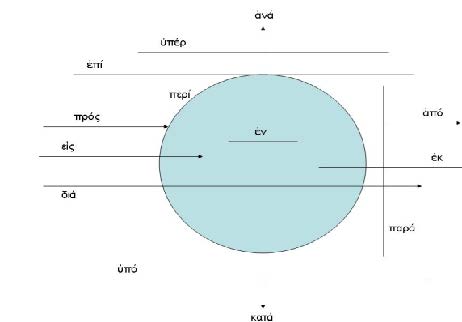 |
|
| Volume 21 Number 12 December 2019 | Page 14 |
David R. Kenney
 The idea that “prepositions matter” may seem like a superfluous point, but one may be surprised how careless one can be with the use of prepositions. Generally speaking, prepositions provide detail as to when or where something occurred, and these words may also indicate how something occurred. It is not uncommon for people unfamiliar with our English language to struggle to choose the correct preposition. Since English is our common language, we take many of the rules we were taught for granted. Of course, sometimes we pick up bad habits and commit errors relating to prepositions without thinking about it. Sometimes I feel like I need to take a class on remedial English myself!
The idea that “prepositions matter” may seem like a superfluous point, but one may be surprised how careless one can be with the use of prepositions. Generally speaking, prepositions provide detail as to when or where something occurred, and these words may also indicate how something occurred. It is not uncommon for people unfamiliar with our English language to struggle to choose the correct preposition. Since English is our common language, we take many of the rules we were taught for granted. Of course, sometimes we pick up bad habits and commit errors relating to prepositions without thinking about it. Sometimes I feel like I need to take a class on remedial English myself!
Koine Greek also has prepositions. One may think that knowing the proper use of prepositions in Greek is a minor matter, but that is a mistake. Consider Acts 2:38 and the expression “for the remission of sins.” The preposition “for” can be used in such a way that does not match what the preposition εἰς means. Translations sometimes prefer to retain “for” so people can argue that baptism is not a salvation issue but a demonstration of salvation that was received prior to baptism. These efforts attempt to argue the term “for” has the meaning “because of,” but this is misleading. Questions I like to ask those that argue baptism is for salvation already obtained is, “Then why is baptism even in the New Testament? Why are baptisms in Acts treated with urgency?”
Take for example this common prepositional chart that I grabbed from the Internet (one of many) that basically shows the same relationship among Greek prepositions. The preposition I want you to notice carefully is εἰς on the left side and pointing directly into the circle. Notice that this preposition shows movement from outside the circle to inside it. You do not have to know Greek to understand the meaning of various prepositions in this chart.
 Scholars point out that εἰς is always forward looking, never backward. You can see this in the chart in that the arrow is pointing into the circle, but different prepositions are used for “in” (ἐν) and “out” (ἐκ). Claiming that “for” in Acts 2:38 is pointing backward to an event that has already occurred clearly does not match this diagram! However, being lost in one’s sins and then moving from a lost to saved condition through repentance and baptism clearly is a forward moving process!
Scholars point out that εἰς is always forward looking, never backward. You can see this in the chart in that the arrow is pointing into the circle, but different prepositions are used for “in” (ἐν) and “out” (ἐκ). Claiming that “for” in Acts 2:38 is pointing backward to an event that has already occurred clearly does not match this diagram! However, being lost in one’s sins and then moving from a lost to saved condition through repentance and baptism clearly is a forward moving process!
If you look at Acts 2:38 in The Interlinear NIV Parallel New Testament in Greek and English: The Nestle Greek Text with a Literal English Translation by Alfred Marshall, you will find an interesting note attached to εἰς. Rather than “for” or “because of,” Marshall has “with a view to” forgiveness of sins. When the NIV came out in 1973, the original translation of Acts 2:38 was “Peter replied: ‘Repent and be baptized, every one of you, in the name of Jesus Christ so that your sins may be forgiven. And you will receive the gift of the Holy Spirit.’” Notice how clear this translation is that repentance and baptism will result “so that your sins may be forgiven.” When this translation came out, there were complaints from various corners about the translation of εἰς. Why? Because they preferred the ambiguity, or they preferred a meaning that fit their presuppositions. Think prepositions are a minor matter? You had better think again. The outcry was so strong, that they yielded and changed the NIV translation in 1984 to “for the forgiveness of your sins.” When those who were a part of the 1973 edition of the NIV were asked about the change, the reply was basically, “We translated it correctly the first time.”
Of course, “for” could be a valid translation of the term if one understands the meaning to be “for the purpose of obtaining” rather than “because of something already obtained,” but this is not how some denominations represent the translation of εἰς, since they minimize the role of baptism in the plan of salvation (if they do not outright dismiss baptism altogether). Need an example of this being done? Consult the Amplified Bible, which reads, “because of the forgiveness of your sins.” The expression “for the forgiveness of sins” is probably the most common translation of this phrase, but notice some others of interest: “unto the remission of sins” (ASV), “into the remission of sins” (CJB), “so that your sins will be forgiven” (CEV), “so that you may have your sins forgiven” (Phillips), “so that your sins may be forgiven” (NRSV) and “to remission of sins” (YLT). While I am certainly not endorsing Bible translations here, one can easily see that there is a difference in treating εἰς as “because of” or “for the purpose of.”
Wayne Jackson is the first I read who made the salient point that the phrase “for the remission of sins” is the exact phrase Jesus used at the instituting of the Lord’s Supper when He said, “For this is My blood of the new covenant, which is shed for many for the remission of sins” (Matthew 26:28 NKJV). Here is a basic question: Had Jesus' blood been shed already, or was His blood about to be shed? It may seem like a basic question, and it is. Jesus instituted the Lord’s Supper before He had shed His blood during the crucifixion. The shedding of His blood was forward looking. In like manner, the people on Pentecost were told, “Repent, and let every one of you be baptized in the name of Jesus Christ for the remission of sins; and you shall receive the gift of the Holy Spirit” because they had yet to repent and to be baptized. Remember, their cry was, “Men and brethren, what shall we do?” Did Peter tell them what to do or what had been done for them? Certainly, Christ had died for their salvation, but the doing was still involved in the repenting and being baptized! By doing so, they moved forward from a lost state and into a saved state.
With all the fuss against a straightforward command to be immersed so that one’s sins can be washed away, it reminds me of the wise counsel a servant gave his master who sought to wash another terminal condition, albeit physical rather than spiritual, away. “My father, if the prophet had told you to do something great, would you not have done it? How much more then, when he says to you, ‘Wash, and be clean’?” (2 Kings 5:13). Sage advice! Repent and be baptized so that your sins may be washed away!![]()
Sources Cited
Jackson, Wayne. “Dallas Professor Rebuffs Common Quibble on ‘Eis.’” ChristianCourier.com.
_ _ _. “The Preposition ‘Eis’ in Acts 2:38.” ChristianCourier.com.
_ _ _. Treasures from the Greek New Testament for the English Reader. Stockton: Courier Publications, 1996.
Overton, Basil. Gems From Greek. Abilene: Quality P., 1991.